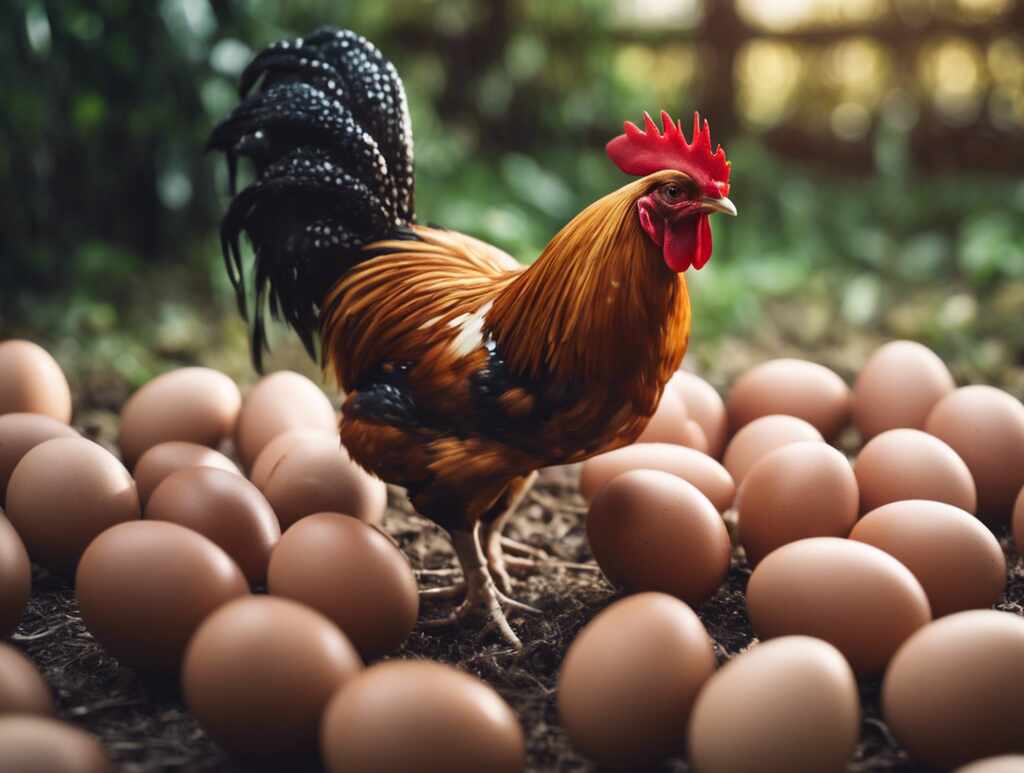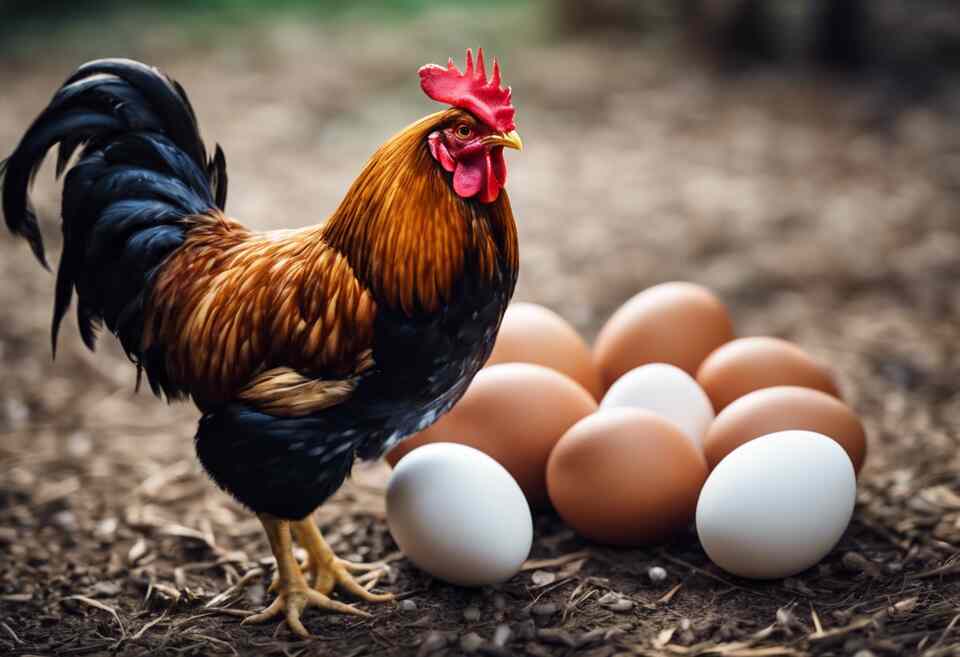Roosters play a vital role in the reproduction process of chickens by fertilizing the eggs laid by hens. Understanding how roosters fertilize eggs is essential for maintaining a healthy and productive flock. Let’s delve into the intricate process of fertilization in chickens.
Table of Contents
The Process of How Roosters Fertilize Eggs
The Anatomy of Roosters
Roosters, also known as male chickens, possess unique reproductive anatomy tailored for fertilizing eggs. The primary male reproductive organ in a rooster is the testes, which are responsible for producing sperm. Unlike mammals, roosters do not have a penis. Instead, they have a cloaca, a multi-functional opening used for both excretion and reproduction.
The Role of Sperm
Sperm production in roosters occurs within the testes. Once the sperm is produced, it is stored in the seminal vesicles, where it awaits ejaculation during mating. During mating, the rooster transfers sperm from the seminal vesicles to the hen’s oviduct, where fertilization takes place.
Mating Behavior
Roosters exhibit distinctive mating behaviors as part of the fertilization process. When a rooster is interested in mating, he performs a courtship dance to attract a hen. This dance involves vocalizations, puffing out of feathers, and circling the hen. Once the hen is receptive, the rooster mounts her and transfers sperm through the cloacal kiss, where their cloacas momentarily touch to allow for sperm transfer.
Fertilization Process
After mating, the sperm travels up the hen’s oviduct, where it fertilizes the egg. The egg is then covered with layers of albumen (egg white), membranes, and a shell as it moves down the oviduct and eventually laid by the hen. If the egg is fertilized, it will have the potential to develop into a chick if incubated under the right conditions.
Factors Affecting Fertilization
Several factors can impact the fertilization process in chickens. The ratio of roosters to hens in a flock can influence the fertilization rate, as having too few roosters can result in decreased fertilization. Additionally, the overall health and age of the roosters and hens play a role in successful fertilization.
Ensuring Successful Fertilization
To ensure optimal fertilization in chickens, it is essential to provide a conducive environment for mating. This includes maintaining a healthy ratio of roosters to hens, ensuring proper nutrition for reproductive health, and allowing for natural mating behaviors to take place. Regular health checks for both roosters and hens can also help identify any issues that may affect fertilization.
Understanding how roosters fertilize eggs sheds light on the intricate reproductive process in chickens. By ensuring the well-being of roosters and hens and providing a suitable environment for mating, you can promote successful fertilization and maintain a thriving flock.
Understanding the Role of Roosters in Poultry Reproduction
Introduction: Roosters play a crucial role in the natural process of fertilizing eggs in poultry. Understanding this process is essential for poultry farmers and enthusiasts alike. Let’s dive into the intricate details of how roosters fertilize eggs and the significance of their role in poultry reproduction.
Rooster’s Reproductive System: The first step in comprehending how roosters fertilize eggs is gaining insight into their reproductive anatomy. Roosters have testes that produce sperm, which is then stored in the cloaca. The cloaca is an opening used for both excretion and reproduction in birds. During mating, the rooster transfers sperm from the cloaca to the hen’s reproductive tract.
Mating Behavior: Roosters exhibit unique mating behaviors as part of the fertilization process. When a rooster is interested in mating, he performs a courtship dance to attract the hen. This dance involves vocalizations, feather fluffing, and circle movements around the hen. Once the hen is receptive, mating occurs.
Fertilization Process: When a rooster mates with a hen, he transfers sperm from his cloaca to the hen’s. The sperm then travels through the hen’s reproductive tract, where fertilization takes place. The sperm fertilizes the egg in the infundibulum, a part of the hen’s oviduct. The fertilized egg continues its journey through the oviduct, where the albumen, shell membranes, and shell are added before being laid.
Significance of Roosters in Poultry Reproduction: Roosters are vital for successful egg fertilization in poultry farming. Without roosters, hens can still lay eggs, but these eggs will be unfertilized and won’t develop into chicks. The presence of roosters ensures the continuation of the flock by fertilizing eggs and enabling the hatching of chicks.
Selective Breeding and Genetics: In modern poultry farming, selective breeding plays a significant role in maximizing desirable traits in offspring. Roosters with favorable genetic characteristics are chosen to mate with hens to pass on these traits to the next generation. This selective breeding process helps improve traits such as egg production, meat quality, and disease resistance in poultry.
Conclusion
Roosters play a pivotal role in poultry reproduction through the process of fertilizing eggs. Understanding how roosters fertilize eggs is essential for anyone involved in poultry farming or interested in the intricacies of avian reproduction. As detailed in this article, roosters use a combination of instinctual behaviors and biological mechanisms to successfully fertilize eggs, contributing to the continuation of various chicken breeds. By comprehending the complex process of rooster fertilization, individuals can better appreciate the significance of these magnificent birds in the cycle of life on farms and beyond.
The process of how roosters fertilize eggs begins with the courtship rituals they perform to attract hens. Through displays of dominance, vocalizations, and physical interactions, roosters establish their position within the flock hierarchy and gain the attention of receptive hens. Once a rooster successfully mates with a hen, sperm is transferred from the male to the female reproductive system, where it fertilizes the developing egg before the shell is formed. This fertilization process is crucial for the production of fertile eggs that can hatch into healthy chicks.
Understanding the role of roosters in poultry reproduction sheds light on the intricate dynamics of avian breeding. Roosters serve as the primary male counterparts to hens, ensuring that eggs are fertilized before they are laid. Without the presence of a rooster, eggs produced by hens will remain unfertilized and will not develop into viable embryos. The genetic material contributed by the rooster during fertilization determines the characteristics of the offspring, influencing traits such as feather color, size, and overall health.
The process of how roosters fertilize eggs is a fascinating aspect of poultry reproduction that highlights the essential role these birds play in the perpetuation of chicken populations. By understanding the intricate steps involved in rooster fertilization, individuals can gain a deeper appreciation for the natural processes that govern avian breeding. From courtship rituals to sperm transfer and fertilization, roosters exhibit remarkable behaviors and biological functions that contribute to the diversity and sustainability of poultry farming.
Next time you observe a rooster proudly crowing in the morning light, remember the vital role it plays in fertilizing eggs and sustaining the circle of life in the poultry world.



